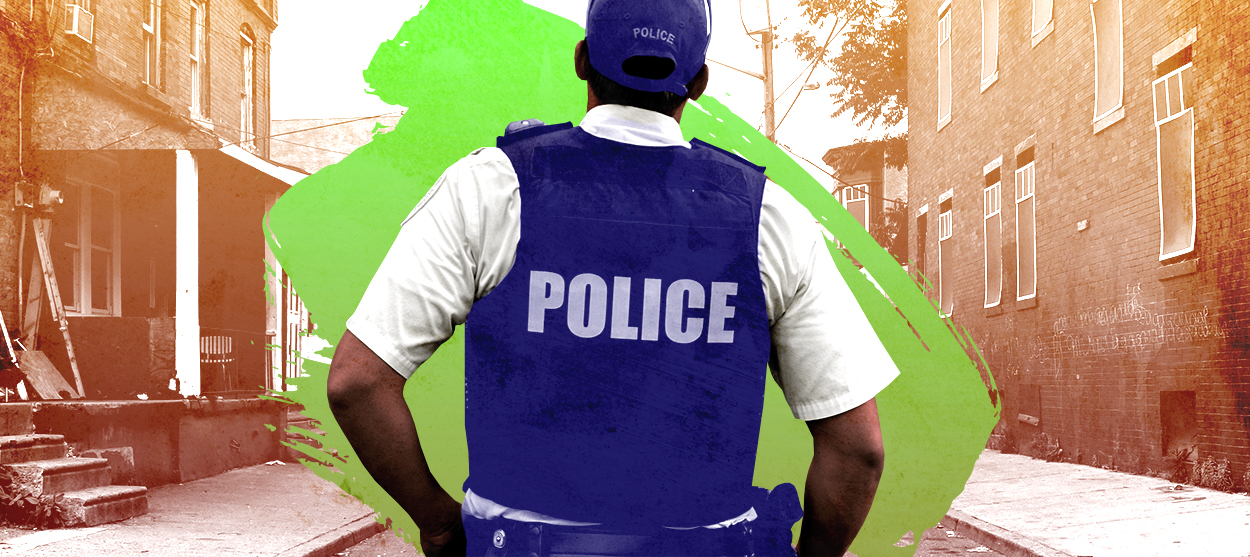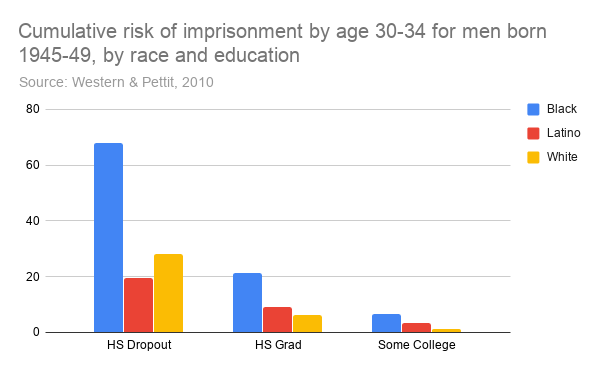The fight against police abuse must include economic equality
Economic deprivation propels racism in America


A free daily email with the biggest news stories of the day – and the best features from TheWeek.com
You are now subscribed
Your newsletter sign-up was successful
As the nation debates various strategies to attack the problem of police abuse in the wake of the George Floyd protests, thus far police departments have gotten the bulk of attention. Proposals for reforming police practices, introducing new laws and regulations, or cutting their disproportionate share of municipal budgets are all under discussion, and rightly so.
But there is another aspect of our national police problem that deserves equal billing with police: economic inequality. Police attention and incarceration are extremely concentrated on poor Americans — especially black ones — who have been torn out of the American social contract. Rebuilding that contract through an assault on poverty, by jacking up taxes on the rich to fund a drastic expansion of the welfare state, would go a long way towards fighting police brutality and mass incarceration.
Let me begin with a study some years ago by sociologists Bruce Western and Becky Pettit. Among other things, they looked at the risk of incarceration by age 34 for a group of men born between 1975 and 1979. They provided breakouts by educational attainment (high school dropouts, high school graduates, and some college attendance), which I have charted here:
The Week
Escape your echo chamber. Get the facts behind the news, plus analysis from multiple perspectives.

Sign up for The Week's Free Newsletters
From our morning news briefing to a weekly Good News Newsletter, get the best of The Week delivered directly to your inbox.
From our morning news briefing to a weekly Good News Newsletter, get the best of The Week delivered directly to your inbox.

Incarceration is a decent proxy for contact with the police, and education is a decent proxy for class — in particular, high school dropouts are overwhelmingly more likely to be unemployed or poor than graduates of either high school or college. It's a rough measure, but the differences are so incredibly huge that they would swamp any mild inaccuracy. We see that black high school dropouts in this cohort had a staggering 68 percent chance of being imprisoned. White dropouts had a still-shocking 28 percent chance — much less than black dropouts, but 23 times the rate of whites with some college, and indeed more than four times that of blacks with some college.
A more recent paper by Nathaniel Lewis at the People's Policy Project found similar conclusions. He broke the population into five class quintiles based on a variety of proxies, and found that when adjusting for class, whites and blacks had a similar risk of being jailed at all, being jailed after an arrest, or being jailed for more than a month. However, the poorest blacks had twice the likelihood of the poorest whites of being jailed for more than a year, in keeping with the above findings.
Another new analysis by Emily Badger and Quoctrung Bui in the The New York Times bears on this situation. They demonstrate that, since the 1970s, the share of city budgets going to police has increased modestly in most cities even as violent crime has fallen sharply.
Putting this together: Crime is down from the 1970s, but inequality is dramatically higher than it was then — about as high now as it was in 1929. As John Clegg and Adaner Usmani argue in Catalyst Journal, police and prisons filled the political void left by the destruction of the New Deal. The (already rather meager) social contract was withdrawn from vast chunks of American society to make political and budget headroom for deregulation, offshoring, tax cuts for the rich, and austerity — leaving an abandoned and disgruntled underclass that was and remains disproportionately black and brown, but nonetheless plurality white.
A free daily email with the biggest news stories of the day – and the best features from TheWeek.com
The main task of police and prisons became political repression. Rather than the state winning a critical mass of consent through its actions and benefits, the lower class was beaten into submission. Police and prosecutors contained the social disorder emerging in part from poverty, inequality, and deindustrialization by constantly hassling the poor and shoving millions of them in prison out of sight of middle-class suburbanites. The incarceration rate skyrocketed starting in the 1980s, but this was largely a lower-class phenomenon, especially for blacks. The incarceration rate of white high-school dropouts roughly doubled, but for black dropouts it tripled, and from a higher base. On the other hand, the incarceration rate of college graduates of all races has remained at barely above zero, even as the rate of college attendance soared.
In other words, police brutality and mass incarceration are intersectional problems, with large components of both race and class (and other factors). "In 2017, a white high school dropout was about fifteen times more likely to be in prison than a black college graduate," Clegg and Usmani write.
America has so much poverty and inequality mainly because it has a tenth-rate welfare state. Where the Nordic countries provide material security for all with universal health care, child allowances, generous benefits for retirement, disability, and unemployment, and so on, funded by dramatically higher taxes, in America a great many people are simply left to rot so the ultra-rich can enjoy gargantuan fortunes. It should come as no surprise that the Nordics have vastly lower rates of violent crime (poverty is heavily correlated with both committing and being a victim of crime), police killings, and incarceration — though the enormous number of guns in America also no doubt plays a part. (There is more to the Nordic model than the welfare state, but it is the foundation of any just society.)
Aside from the broad political effects of restoring the social contract, putting money into the pockets of the lower class directly bolsters their power. Money can make rent or a mortgage payment (and hence prevent eviction), hire a lawyer, bail a friend or family member out of jail, help bring the attention of the press or local politicians, or fund a dozen other ways of exerting social influence.
In sum, if we slash inequality by expanding welfare, all evidence suggests we can move the poorest cohorts in the above charts out of police cruisers and prisons, and up towards the outcomes of their richer peers — ideally in concert with a root-and-branch overhaul of how policing is conducted.
The point here is not to say class is somehow a more important issue than race. On the contrary, economic deprivation is a major way that racism works in this country. Compared to whites, black Americans are twice as likely to be unemployed, have about a tenth as much wealth on average, and have a poverty rate 2.4 times greater. This economic injustice can be remedied by restructuring the national economy. It would not solve racist policing or imprisonment completely, but it would help a tremendous amount — and it could potentially mobilize a much larger constituency.
But as New York's Eric Levitz argues, the money for this cannot only come from defunding police departments. Cops and prisons do take up far too much of most city budgets, but their cost is relatively modest in the scale of the national economy. As of 2017, state and local governments spent roughly $200 billion on police and prisons, with the federal government kicking in some extra. But to bring U.S. social spending up to the level of Denmark would require 10 percent of GDP — on the order of $2 trillion. America needs vastly more taxation and spending to seriously attack the inequality that is tearing this country apart.
Want more essential commentary and analysis like this delivered straight to your inbox? Sign up for The Week's "Today's best articles" newsletter here.
Ryan Cooper is a national correspondent at TheWeek.com. His work has appeared in the Washington Monthly, The New Republic, and the Washington Post.
-
 Local elections 2026: where are they and who is expected to win?
Local elections 2026: where are they and who is expected to win?The Explainer Labour is braced for heavy losses and U-turn on postponing some council elections hasn’t helped the party’s prospects
-
 6 of the world’s most accessible destinations
6 of the world’s most accessible destinationsThe Week Recommends Experience all of Berlin, Singapore and Sydney
-
 How the FCC’s ‘equal time’ rule works
How the FCC’s ‘equal time’ rule worksIn the Spotlight The law is at the heart of the Colbert-CBS conflict
-
 The billionaires’ wealth tax: a catastrophe for California?
The billionaires’ wealth tax: a catastrophe for California?Talking Point Peter Thiel and Larry Page preparing to change state residency
-
 Bari Weiss’ ‘60 Minutes’ scandal is about more than one report
Bari Weiss’ ‘60 Minutes’ scandal is about more than one reportIN THE SPOTLIGHT By blocking an approved segment on a controversial prison holding US deportees in El Salvador, the editor-in-chief of CBS News has become the main story
-
 Has Zohran Mamdani shown the Democrats how to win again?
Has Zohran Mamdani shown the Democrats how to win again?Today’s Big Question New York City mayoral election touted as victory for left-wing populists but moderate centrist wins elsewhere present more complex path for Democratic Party
-
 Millions turn out for anti-Trump ‘No Kings’ rallies
Millions turn out for anti-Trump ‘No Kings’ ralliesSpeed Read An estimated 7 million people participated, 2 million more than at the first ‘No Kings’ protest in June
-
 Ghislaine Maxwell: angling for a Trump pardon
Ghislaine Maxwell: angling for a Trump pardonTalking Point Convicted sex trafficker's testimony could shed new light on president's links to Jeffrey Epstein
-
 The last words and final moments of 40 presidents
The last words and final moments of 40 presidentsThe Explainer Some are eloquent quotes worthy of the holders of the highest office in the nation, and others... aren't
-
 The JFK files: the truth at last?
The JFK files: the truth at last?In The Spotlight More than 64,000 previously classified documents relating the 1963 assassination of John F. Kennedy have been released by the Trump administration
-
 'Seriously, not literally': how should the world take Donald Trump?
'Seriously, not literally': how should the world take Donald Trump?Today's big question White House rhetoric and reality look likely to become increasingly blurred
